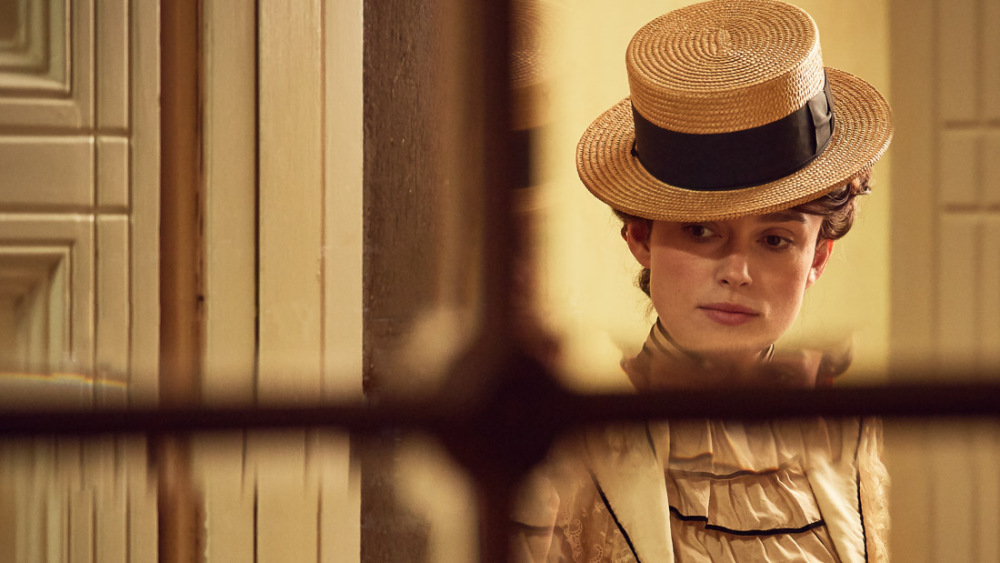COLETTE
Bleecker Street and 30 West
Reviewed by: Harvey Karten
Director: Wash Westmoreland
Screenwriter: Richard Glatzer, Rebecca Lenkiewicz, Wash Westmoreland
Cast: Keira Knightley, Dominic West, Eleanor Tomlinson, Fiona Shaw
Screened at: Park Avenue, NYC, 8/1/18
Opens: September 21, 2018
If you think that Paris has always been a sophisticated city with a reputation for progressivism, think again. Though Renoir’s paintings were accepted by Parisians, the impressionist painter had to bear with years of bad reviews. And in 1913, when Stravinsky’s “The Rite of Spring” was first performed on the Paris stage, there were outright riots as the audience had never heard tones such as those played by the mournful bassoon, the dissonance that has become the watchword of contemporary music, or the knock-kneed women that appeared on the stage when the overture was completed. The public, in fact, had been prepared with choice vegetables, looking for a fight, people who, if they were an elite attending a concert, could be mistaken for some of the deplorables that Hillary cited in her campaign.
But, you say, Paris is still the city of love! Yes, except that while women could be accepted as companions for men three times their age, not so long ago, homosexuality could not. In one of the melodramatic incidents in a movie that moves along smoothly without Hollywood-style mayhem, the crowd became antagonistic only when two women kiss each other on stage. Director Wash Westmoreland, whose “Still Alice” investigates problems when a linguistics professor and family have their bond tested when she is diagnosed with Alzheimer’s Disease, now finds the title character’s bond with her husband tested as well. There’s plenty of conflict in his “Colette,” a biopic of one of France’s great novelists, who during most of her career suffered the indignity of ghost-writing salacious novels for her husband Willy (Dominic West), the much older husband who notes that a woman simply could not be published in Europe in the early twentieth century. Like the couple in Björn Runge’s “The Wife,” dealing with a talented woman whose books were published under the name of her husband, “Colette” demonstrates yet another way that today’s #MeToo feminism is the happy background for writers and directors who try to compensate for society’s prejudice against creative females.
“Colette” could probably do just fine with any reputable star in the lead role, but Keira Knightley’s awards-worthy performance allows the film to soar both emotionally and intellectually. Though some will grouse that a French woman is the subject of a movie produced in the UK with British actors, you would do well to overlook that and enjoy the delightful unfolding of a career centered on a woman who could have spent her life in obscurity had she not decided to break away from her husband and knock out novels with her own name.
The film opens in 1893 when Colette (Keira Knightley), a country girl from Burgundy, is whisked away to Paris by Willy (Dominic West), a fake novelist who runs a stable of ghost writers and is now to include his beautiful wife among the serfs. One may wonder how Colette put up with the womanizer who even at age 46 had women in the early twenties throwing themselves at him. Noting that his wife, who in at least one instance is locked up in a room with the demand that she spend four hours writing before being freed, emerges with pages showing considerable spice. Willy sees a way out of his perpetual poverty brought about by gambling, dining and whoring. After the repo guys take away his furniture, he is saved financially when Colette” Claudine at School” becomes a best seller.
Colette turns out to be bisexual, carrying on an affair with an American from Louisiana (Eleanor Tomlinson), using her experiences as juice for future novels. The most interesting attraction is between Colette and Missy (Denise Gough), a woman who resembles Ellen De Generis with her suit, close hair style, and masculine carriage.
As with blockbuster thrillers, the women come out on top, so to speak, Colette gets revenge, divorcing her miserable husband, and goes on to write thirty novels. The picture, scripted by the director, Richard Glatzer, and Rebecca Lenkiewicz, is constructed in a conventional manner (unusual, perhaps, considering the sexual progressivism of the theme) and is not only a great story but highlights a marvelous Keira Knightley as a turn-of-20th-century feminist.
Unrated. 111 minutes. © 2018 by Harvey Karten, Member, New York Film Critics Online
Story – B+
Acting – A
Technical – B+
Overall – B+

